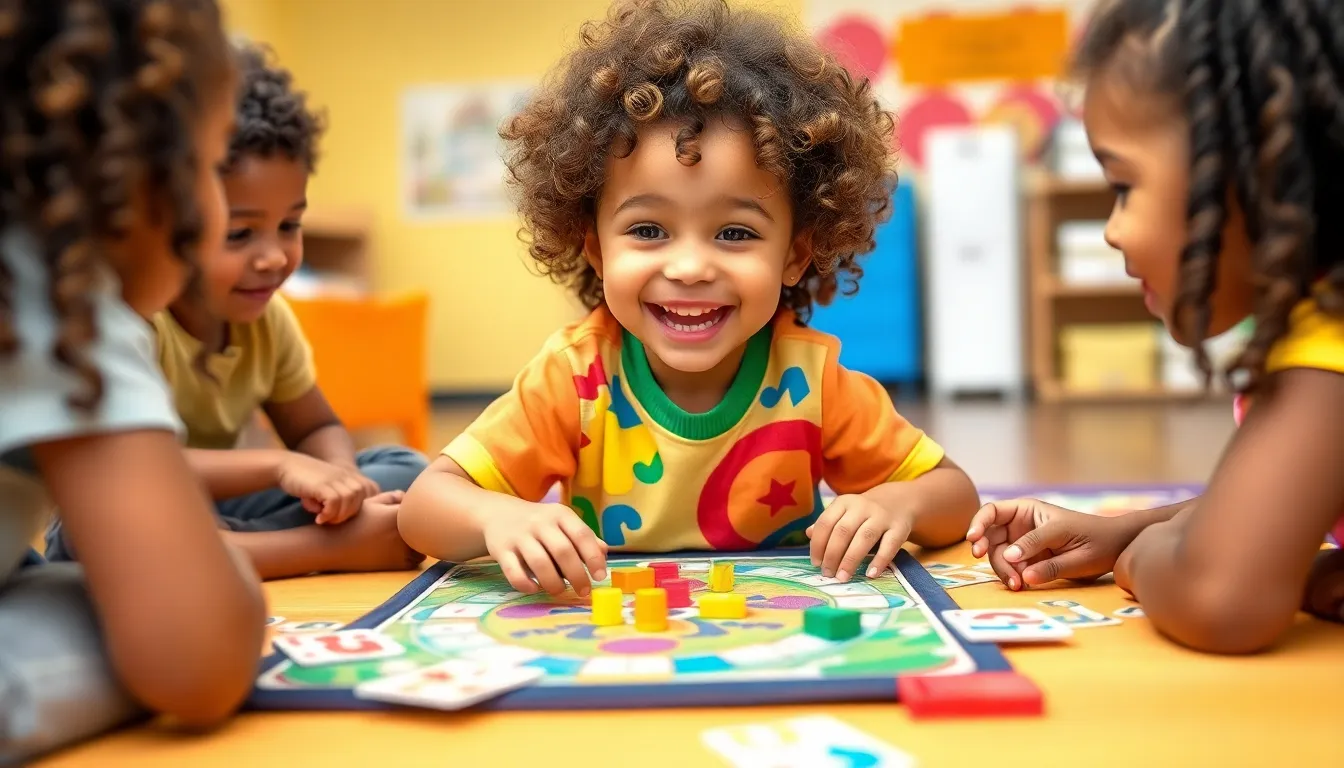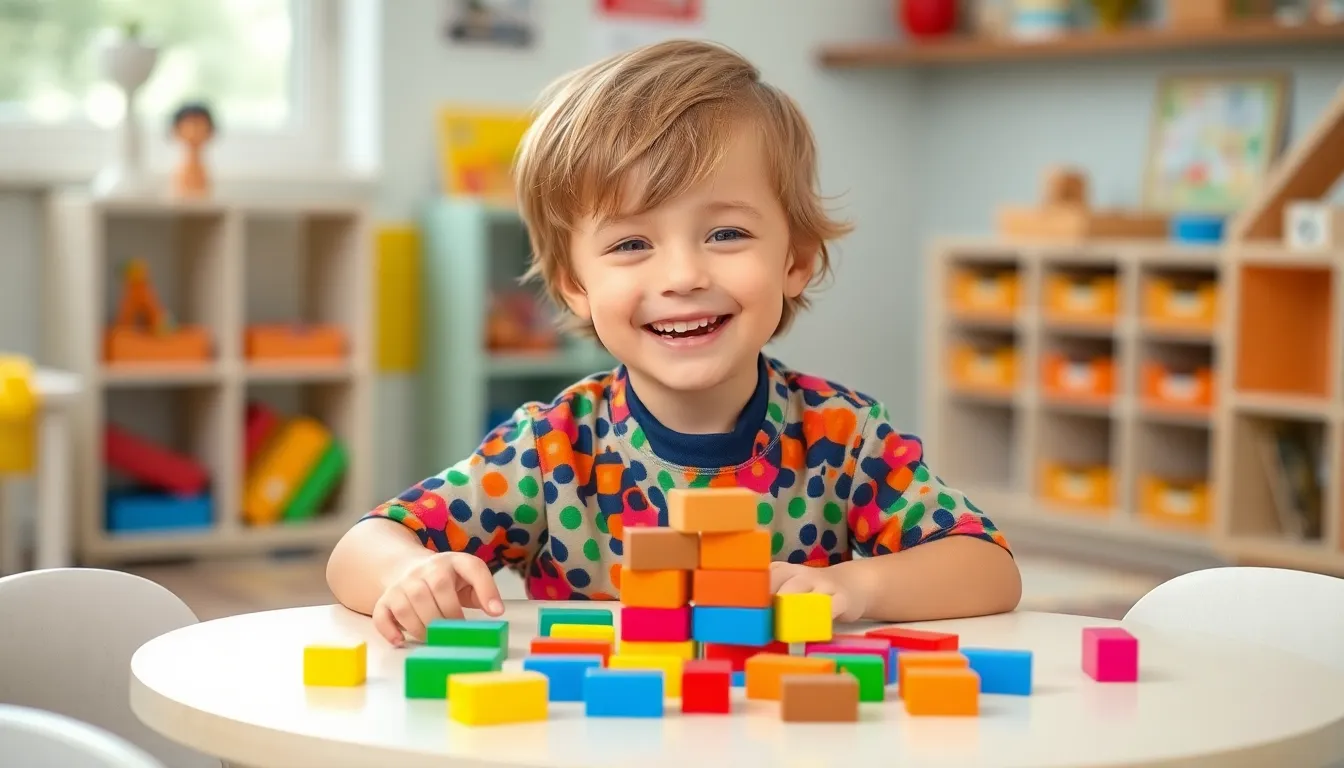Math doesn’t have to be a dreaded subject, especially for preschoolers! Imagine a world where numbers dance and shapes sing. That’s the magic of math games designed for little learners. These playful activities turn the often intimidating realm of math into a fun adventure that kids can’t resist.
Table of Contents
ToggleBenefits Of Math Games For Preschoolers
Math games offer numerous advantages for preschoolers, making learning enjoyable and effective. Engaging activities foster a positive attitude towards math from an early age.
Enhancing Early Math Skills
Early math skills develop through interactive play. Counting games promote number recognition. Simple addition and subtraction activities introduce foundational concepts. Using manipulatives, like blocks or counters, enhances understanding of quantities. Rhythmic patterns in games cultivate an awareness of sequences. These experiences build a strong numerical foundation that supports future learning.
Promoting Problem-Solving Abilities
Problem-solving skills flourish with math games. Engaging scenarios challenge preschoolers to think critically. They learn to analyze situations and explore various solutions. Games that involve puzzles or patterns sharpen analytical thinking. Collaboration during gameplay encourages discussion and negotiation among peers. These interactions enhance social skills while reinforcing cognitive development, creating well-rounded learners.
Types Of Math Games For Preschoolers

Math games for preschoolers come in various forms, each designed to engage young minds while building foundational skills. Different types of games provide learning opportunities through play.
Board Games
Board games provide a structured way to practice math skills. Games like “Chutes and Ladders” and “Monopoly Junior” incorporate counting and simple addition. Players navigate the board while reinforcing number recognition and turn-taking. These games also promote critical thinking as preschoolers strategize their moves. The tactile experience of moving pieces engages multiple senses, enhancing memory retention.
Card Games
Card games offer versatility in practicing math concepts. Classic games like “Uno” help with number recognition and color identification. “Go Fish” encourages counting and matching, reinforcing basic math skills in a fun way. Preschoolers benefit from social interactions while playing these games. Engaging with peers fosters communication skills, as they discuss numbers and strategies.
Online Math Games
Online math games introduce technology into learning. Websites like ABCmouse and Cool Math Games provide interactive and fun activities. Young learners explore concepts like addition, subtraction, and shapes through engaging visuals. These online platforms often feature rewards, motivating preschoolers to continue learning. Parents appreciate the tracking features that monitor progress and skill development.
How To Choose The Right Math Game
Selecting the ideal math game for preschoolers involves understanding their developmental needs and learning goals.
Consider Age Appropriateness
Age-appropriate games ensure preschoolers remain engaged and capable of grasping concepts. Games aimed at younger children often focus on basic counting and number recognition. Preschoolers aged 3 to 4 benefit from simple games featuring colorful visuals and tangible manipulatives like counting blocks. For children aged 5, games can introduce basic addition and subtraction while incorporating vibrant gameplay mechanics. Assessing the game’s complexity helps ensure it matches the child’s cognitive abilities, preventing frustration and fostering a positive attitude toward learning.
Focus On Learning Objectives
Understanding specific learning objectives enhances the selection process for math games. Seek games targeting foundational skills such as counting, shape recognition, and early problem-solving. Games integrating multiple concepts, like number sequencing or simple arithmetic, promote comprehensive learning experiences. Additionally, consider whether the game encourages collaboration and communication with peers. Games structured around social interaction can build critical thinking and negotiation skills. Choosing games that align with educational goals maximizes the potential for developing early math skills through enjoyment and engagement.
Tips For Incorporating Math Games Into Learning
Incorporating math games into preschool learning can enhance engagement and retention. These strategies maximize the effectiveness of educational play.
Creating a Fun Learning Environment
Establishing a playful atmosphere enhances the educational experience. Bright colors, engaging visuals, and accessible materials capture children’s attention. Incorporate a variety of math games, such as board games and interactive puzzles. These activities invite exploration and make learning enjoyable. Set a routine that includes game time, ensuring consistency and anticipation. Lastly, celebrate small achievements to encourage a positive attitude towards math.
Encouraging Cooperative Play
Collaboration fosters social skills and problem-solving abilities. Choose games that require teamwork, allowing preschoolers to share ideas and strategies. Encourage turn-taking, teaching patience and respect for others. Games like “Uno” can engage multiple players, facilitating discussions and negotiations among peers. Create group challenges that promote collaboration, helping children learn from each other. By fostering relationships through play, preschoolers develop essential communication skills while enjoying math.
Math games for preschoolers offer a dynamic way to introduce essential skills while making learning enjoyable. By transforming math into a playful experience, these games not only enhance foundational concepts but also strengthen social interactions among peers. As children engage in collaborative gameplay they develop critical thinking and problem-solving abilities that will serve them well in future learning.
Choosing the right games tailored to a child’s developmental stage ensures that they stay motivated and excited about math. Incorporating these activities into daily routines fosters a love for learning and builds confidence in their abilities. Ultimately, math games create a vibrant learning environment where preschoolers can thrive both academically and socially.



